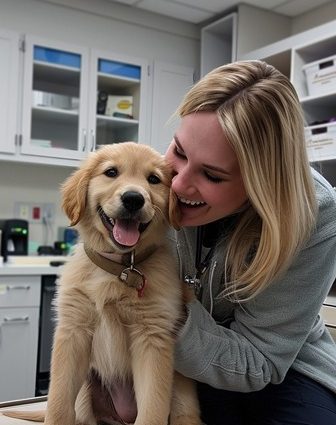Understanding when to change your pet’s diet is crucial for maintaining their health and well-being. According to veterinarians, several signs can indicate the need for dietary adjustments, including changes in weight, energy levels, digestive issues, or specific medical conditions. Consulting your vet ensures that dietary changes meet your pet’s unique nutritional needs and lifestyle. This guidance helps ensure your furry friend’s continued happiness and health.
Recognizing when it is time to change your pet’s diet and consulting your veterinarian for guidance can ensure that your pet continues to receive the necessary nutrients for their specific life stage, health condition, and activity level. This guide outlines the key indicators that it might be time to change your pet’s diet according to your vet.
1. Age and Life Stage Changes
Their nutritional requirements change as pets grow from puppies or kittens into adults and seniors. Puppies and kittens need diets rich in protein and calories to support their rapid growth and development. Adult pets require balanced nutrition to maintain their health and energy levels, while senior pets may need diets tailored to address age-related health issues such as joint health and weight management. Your vet can recommend appropriate food for each life stage.
2. Weight Management
If your pet is gaining or losing weight unintentionally, it may be time to adjust their diet. Obesity can lead to a range of health issues, including diabetes, heart disease, and joint problems. Conversely, unexplained weight loss can be a sign of underlying health issues such as metabolic disorders or gastrointestinal problems. Your vet can help determine the cause of weight changes and recommend a diet that supports healthy weight management. In some cases, if digestive problems are severe, veterinary surgery in Eastham, MA, can help you with digestive problems that need surgical intervention.
3. Activity Level Changes
Changes in your pet’s activity level can also necessitate a diet change. Active pets, such as working dogs or those participating in regular exercise or sports, may require a higher-calorie diet to meet their energy needs. On the other hand, pets that become less active due to age, injury, or lifestyle changes may need fewer calories to prevent weight gain. Your vet can suggest dietary adjustments based on your pet’s activity level.
4. Health Conditions
Certain health conditions may require specialized diets to manage symptoms or support recovery. Conditions such as diabetes, kidney disease, allergies, and gastrointestinal disorders often benefit from therapeutic diets designed to address specific health needs. If your pet is diagnosed with a health condition, your vet will recommend an appropriate diet to help manage the condition and improve your pet’s quality of life. It can be highly beneficial to consult a specialty veterinarian and inquire about their internal medicine vet services to ensure your pet receives the most effective care.
5. Allergies and Food Sensitivities
If your pet shows signs of food allergies or sensitivities, such as itching, gastrointestinal upset, or ear infections, it may be time to change their diet. Your vet can help identify the allergens or irritants and recommend a hypoallergenic or limited-ingredient diet to alleviate symptoms and improve your pet’s health.
6. Coat and Skin Health
A dull coat, excessive shedding, dry skin, or recurrent skin infections can be indicators that your pet’s current diet is not meeting its nutritional needs. Essential fatty acids, vitamins, and minerals are crucial in maintaining healthy skin and coat. Your vet can recommend dietary changes or supplements to improve your pet’s skin and coat health.
7. Digestive Issues
Frequent digestive issues such as vomiting, diarrhea, constipation, or gas can indicate your pet’s diet does not agree with them. Changing to a more digestible food formulated for sensitive stomachs can help alleviate these symptoms. Your vet can guide you in selecting a diet that supports healthy digestion.
8. Dental Health
Dental health is essential for overall health, and diet plays a role in maintaining healthy teeth and gums. If your pet has dental issues such as tartar buildup, gum disease, or tooth decay, your vet may recommend a diet that promotes dental health. This could include specially formulated kibble that helps clean teeth or a shift to wet food if chewing dry kibble is painful. Additionally, their veterinary dental services can provide comprehensive care to address and prevent dental problems in your pet, ensuring they maintain a healthy mouth.
9. Life Changes
Significant life changes, such as moving to a new home, changing family dynamics, or adding a new pet, can affect your pet’s appetite and dietary needs. Stress and anxiety can lead to changes in eating habits. Consulting with your vet during these times can help you adjust your pet’s diet to ensure they receive proper nutrition.
10. Professional Recommendations
Routine vet check-ups often include assessments of your pet’s diet and overall health. Your vet may recommend dietary changes based on their professional evaluation, even if your pet appears healthy. Regularly discussing your pet’s diet with your vet ensures you provide the best nutrition for your pet’s needs.
Wrapping Up
Recognizing when to change your pet’s diet is crucial for their health and well-being. Factors such as age, weight, activity level, health conditions, allergies, and life changes can all impact your pet’s nutritional needs. Regular consultations with your veterinarian ensure your pet receives the appropriate diet for their specific circumstances, promoting a healthy and happy life. By staying attentive to your pet’s dietary needs and following your vet’s recommendations, you can help your furry companion thrive.

